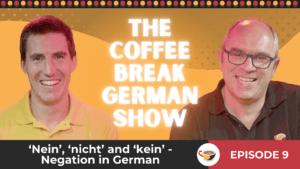How do you ask questions in German?
Questions are essential to every conversation and will always be part of your interactions when visiting a German-speaking country.
So, read on, as we’re going to answer all your questions about forming questions in German!
The Coffee Break German Show is a podcast series of bite-sized, friendly conversations, in which we demystify tricky German language topics. In the latest episode, Mark and Thomas look at how to form questions in German, focusing on the different question words, as well as sentence structure.
Continue reading to find out more and why not listen to the podcast episode as you go?
Die W-Wörter
All question words in German begin with the letter w. We’ll look at each of these in turn.

Wann?
Wann? means “when?”. Let’s start by looking at some examples using this question word.
Wann öffnet das Museum?
When does the museum open?
Wann fährst du nach Slowenien?
When are you going to Slovenia?
You’ll notice that the question word, wann?, starts the sentence, then the verb is next to it, in second position. The subject is in the third position, after the verb:
question word > verb > subject
Was?
Was? means “what?”. For questions with was?, we follow a similar structure.
Was denkst du?
What do you think?
Wer?
Wer? means “who?”. This question word looks and sounds a little like “where” in English, but it means “who”.
Wer kommt zur Party?
Who is coming to the party?
In the above example the pattern is:
question word > verb > object (location)
Note that wer is functioning as the subject of the sentence in this case.
Wo?
Wo? means “where?”. For example:
Wo liegt die Kirche?
Where is the church?
Wo ist die Bäckerei?
Where is the bakery?
Woher?
Woher? means “from where?” or “where from?”. Let’s see an example:
Woher kommst du?
Where do you come from?
“Where” can sometimes be used in English where woher would be needed in German. The suffix -her can be detached and be placed at the end of a question. This does not change the meaning of the question at all:
Wo kommst du her?
Where do you come from?
Wohin?
Wohin? means “where to?”. For example:
Wohin fährst du?
Where are you going to?
Wohin fährst du in den Ferien?
Where are you going to in the holidays?
Wo cannot be used where wohin would be needed in German. As Thomas mentions in the podcast, there’s a handy trick. The suffix -hin can be detached and added at the end of a question:
Wo fährst du morgen hin?
Where are you travelling to tomorrow?
Wie?
Wie? means “how?”. Here are some examples:
Wie viel kostet das?
How much does that cost?
Wie geht’s dir?
How are you?
As Thomas mentions, wie can be combined with other words to form other questions besides “how”.
Wie spät ist es?
What time is it? (literally, “how late is it?”)
Warum?
Warum? means “why?”. Let’s see this in an example sentence:
Warum lernen wir Fragewörter?
Why are we learning question words?
Wieso can also be used to mean “why”, as can weshalb. There can be regional differences in which question words are used. For example, wieso is more common in the south of Germany.
Forming yes/no or closed questions
The word order changes slightly for this type of question, but there is no question word. The verb comes first, so the subject is next. For example, here’s a question that Coffee Break German learners will be very familiar with from the start of our lessons!
Bist du bereit?
Are you ready?
Let’s see how a previous example question can be altered to become a yes/no question:
Wann fährst du nach Slowenien? > Fährst du nach Slowenien?
When are you going to Slovenia? > Are you going to Slovenia?
Here, the sentence structure is:
verb > subject > object (location)
A visual summary

Getting used to forming questions in German can take some time, but don’t worry, the more you practise and hear people having conversations the more natural questions will become.
If you found this post interesting, make sure to listen to the full episode with Mark and Thomas on The Coffee Break German Show. This is the series in which we look at a range of topics for German learners, so make sure to subscribe to our podcast feed or our channel on YouTube.
Plus! To get regular free German lessons in your inbox, you can sign up for our short (coffee-break-sized) email lessons that will help you improve your German. You will also hear from Mark, the founder of Coffee Break Languages, giving advice for language learners at any level. Sign up below!
Happy Coffee Breaking!



